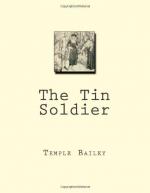She kissed him and clung to him and then went upstairs. She undressed and said her prayers, put Polly-Ann on her cushion, turned off the light, and got into bed.
Then she lay in the dark, facing it squarely.
The things she had said to her father were not true. She didn’t want him to go to France. She didn’t want Derry to go. She was glad that Derry’s mother had made him promise. She didn’t care who called him a coward. She cared only to keep her own.
There wasn’t any sense in it, anyhow. Why should Daddy and Derry be blown to pieces—or made blind—or not come back at all? Just because a barbarian had brought his hordes into Belgium? Well, let Belgium take care of herself—and France.
She shuddered deeper down into the bed. She wasn’t heroic. Hilda had been right about that. She was willing to knit miles and miles of wool, to go without meat, to go without wheat, to wear old clothes, to let the furnace go out and sit shivering in one room by a wood fire, she was willing to freeze and to starve, but she was not willing to send her men to France.
She found herself shaking, sobbing—.
Hitherto war had seemed a glorious thing, an inspiring thing. She had thrilled to think that she was living in a time which matched the days of Caesar and Alexander and of Napoleon, of that first Richard of England, of Charlemagne, of Nelson and of Francis Drake, of Grant and Lee and Lincoln.
Even in fiction there had been Ivanhoe and—and Alan Breck—and even poor Rawdon Crawley at Waterloo—fighters all, even the poorest of them, exalted in her eyes by their courage and the clash of arms.
But there wasn’t any glory, any romance in this war. It was machine guns and bombs and dirt, and cold and mud; and base hospitals, and men screaming with awful wounds—and gas, and horrors, and nerve-shock and—frightfulness. She had read it all in the papers and in the magazines. And it had not meant anything to her, it had been just words and phrases, and now it was more than words and phrases—.
When the hordes of people had swept into Washington, changing it from its gracious calm into a seething and unsettling center of activities, she had been borne along on the wings of enthusiasm and of high endeavor. She had scolded women who would not work, she had scorned mothers and wives who had sighed and sobbed because their men must go. She had talked of patriotism!
Well, she wasn’t patriotic. Derry would probably hate her when she told him. But she was going to tell him. She wouldn’t have him blown to pieces or made blind or not come back at all. And in the morning, she would beg Daddy—she would beg and beg!
As she sat up in bed and looked wildly about her, it seemed as if all the corners of the little room were haunted by specters. A long time ago she had seen Maude Adams in “L’Aiglon.” She remembered now those wailing voices of the dead at Wagram. And in this war millions of men had died. It seemed to her that their souls must be pressing against the wall which divided them from the living—that their voices must penetrate the stillness which had always shut them out. “How dare you go on with it? Are men made only for this?”




